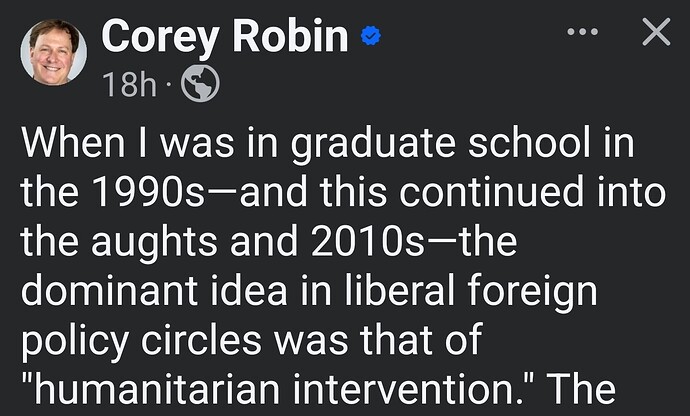When i visited Japan before COVID there was a guy with a megaphone in Tokyo giving an impassioned rant against foreigners ![]()
Yeah, Japan has a serious anti-immigrant/racist strain in their politics, sadly.
Got links for that one?
Not a huge surprise…
The claim was that though states should ordinarily respect the sovereignty of other states, under extreme circumstances, say of genocide or ethnic cleansing, it was not just the right, but the obligation, of the international community, to take coercive action, including using military force and violence, to stop the genocide or ethnic cleansing. Occasionally, the theory went, this might involve or entail toppling the regime that was engaged in the genocide. Thus Vietnam was allowed to invade Cambodia and overthrow the Khmer Rouge, Tanzania was allowed to invade Uganda and topple the Idi Amin regime, NATO overthrew Milosevic. Or, more minimally, France was authorized to invade Rwanda to establish a safe zone there for the Tutsi, and so on. While these actions were often framed as the obligation of the “international community,” the fact that the actors were usually neighboring states or former colonial overseers suggests that power politics was accepted as a legitimate adjunct to the humanitarian intervention regime. That local or former colonial states might have other interests besides humanitarian ones—that the interveners were not always the United Nations as a whole—did not detract from the fact that military violence was being used to stop genocide. Again, this was a common liberal mainstream opinion between the early 1990s up through the Obama administration, which saw NATO intervene in Libya on similar grounds. Now we’re confronted with a genocide in Gaza. Should neighboring states be authorized to invade Israel and stop the genocide there, even if that means the Netanyahu regime is toppled? (And don’t forget: the Vietnamese who overthrew the Khmer Rouge were hardly models of liberalism or democracy themselves.) What say the liberal humanitarians now? Where have all the liberal humanitarians gone? Long time passing.
It was always just power and realpolitik.
Even if you look at the examples he gives, the “humanitarian intervention” narrative falls apart completely.
The reaction of the West to the overthrow of the Khmer Rouge was to claim that they were still the legitimate government and fund the camps in Thailand from where they launched their guerrilla war against the anti-genocide government.
The French intervention in Rwanda is also an odd one to bring up, becaus their intervention stopped the advance of the RPF, which was overthrowing the genocidal government. Their “safe zone” was a safe place for the genocidaires, and allowed the orderly evacuation of the Interahamwe into the Congo, from where they continued to fight, leading directly into the Congo wars.
And of course, the interventions in the middle east were obvious cases where humanitarian concerns are only brought up where convenient. Libya was bombed to remove Gaddafi, but now we ignore a permanent state of war and slavery happening in the open. In Syria, the west has flipped from deep concern over human rights to ignoring the slaughter of Druze, Alawites and minorities now that the Turkish and gulf-state backed “moderate rebels” who used to be Al-Qaida are in charge.
In reality “Liberal Interventionism” is just propaganda. A series of nice stories to tell western news consumers in order to justify whatever actions their governments wanted.
Yeah. And the “liberal humanitarians” like to fall for it. I don’t think Robin would disagree with you.
Once again, one day everyone will have always been against this.
I remember flicking through Thatcher’s memoirs for stuff like how she justified supporting the Khmer Rouge after the genocide.
I was disappointed that it was just bog standard lies and bullshit.
What did you expect, a well reasoned philosophical argument?
I thought there might be an argument in favour made, but there wasn’t.
Nor for her elevation of paedophiles, nor her elevation of Jimmy Saville, I don’t think she mentioned the begging letters she used to write to Reagan whining that engaging in nuclear arms reduction might make voters think they were bad and vote for Labour so could he please keep stoking the Cold War?
The Right Honourable The Baroness Margaret Hilda Thatcher, LG OM DStJ PC FRS HonFRSC, in her long and wretched life, managed three achievements I approve of:
a) She was part of the team that came up with softice, and I like softice.
b) She wasn’t exactly pro EU, but she did realise that being a member would work out better for the UK than not being a member.
c) She correctly saw Mikhail Sergeyevich Gorbachev, then chair of the Foreign Affairs Committee, as the up and coming man in the USSR and opened doors in the West for him with her “we can do business together” verdict. I think this laid part of the groundwork on how the Implosion of the USSR was handled by the West. This could have gone down quite different.
Everything else… ewww.




